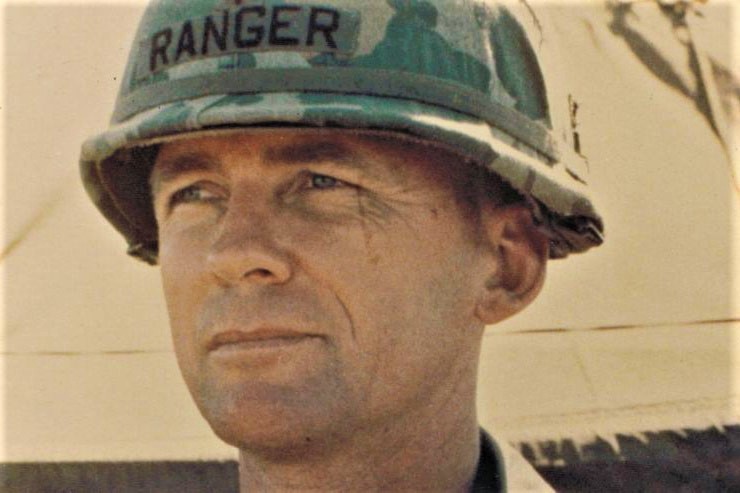
Last Friday, Colonel Ralph Puckett, Jr. was awarded the Medal of Honor in a White House ceremony.
“I’m incredibly proud,” President Biden said, “to give Col. Ralph Puckett’s act of valor the full recognition that he always deserved. Colonel, I’m humbled to have you here today.”
The White House statement reads, in part:
“Then-First Lieutenant Ralph Puckett, Jr. distinguished himself by acts of gallantry and intrepidity above and beyond the call of duty, while serving as the Commander, 8th U.S. Army Ranger Company during the period of November 25, and 26, 1950, in Korea.
“As his unit commenced a daylight attack on Hill 205, the enemy directed mortar, machine gun, and small arms fire against the advancing force. To obtain supporting fire, First Lieutenant Puckett mounted the closest tank, exposing himself to the deadly enemy fire. Leaping from the tank, he shouted words of encouragement to his men and began to lead the Rangers in the attack. Almost immediately, enemy fire threatened the success of the attack by pinning down one platoon.
“Leaving the safety of his position and with full knowledge of the danger, First Lieutenant Puckett intentionally ran across an open area three times to draw enemy fire, thereby allowing the Rangers to locate and destroy the enemy positions and to seize Hill 205.
“During the course of the night, the enemy launched a counterattack which lasted four hours. Over the course of the counterattack, the Rangers were inspired and motivated by the extraordinary leadership and courageous example exhibited by First Lieutenant Puckett. As a result, five human wave attacks by a battalion strength enemy element were repulsed.
“During the first attack, First Lieutenant Puckett was wounded by grenade fragments, but he refused evacuation and continually directed artillery support that decimated attacking enemy formations, repeatedly abandoned positions of relative safety to make his way from foxhole to foxhole to check the company’s perimeter, and distributed ammunition amongst the Rangers.
“When the enemy launched a sixth attack, it became clear to First Lieutenant Puckett that the position was untenable due to the unavailability of supporting artillery fire. During this attack, two enemy mortar rounds landed in his foxhole, inflicting grievous wounds which limited his mobility. Knowing his men were in a precarious situation, First Lieutenant Puckett commanded the Rangers to leave him behind and evacuate the area. Feeling a sense of duty to aid him, the Rangers refused the order and staged an effort to retrieve him from the foxhole while still under harassing fire from the enemy.
“Ultimately, the Rangers succeeded in retrieving First Lieutenant Puckett and they moved to the bottom of the hill, where First Lieutenant Puckett called for devastating artillery fire on the top of the enemy controlled hill.
“First Lieutenant Puckett’s extraordinary heroism and selflessness above and beyond the call of duty were in keeping with the highest traditions of military service.”
Over the course of his career, Puckett has demonstrated his extraordinary selflessness many times. His awards include two Distinguished Service Crosses (one which was upgrade to the Medal of Honor he received, Friday); two Silver Stars; two Legions of Merit; two Bronze Stars with V device for valor; five Purple Hearts; ten Air Medals; the Army Commendation Medal; and the World War II Victory Medal, among others. In addition, he earned the Combat Infantryman’s Badge with star, Special Forces Tab, Ranger Tab, Master Parachutist Wings, Glider Badge and Columbian Lancero Ranger Badge.
In my book, What Do You Stand For? an anthology of ethical stories, former Marine Captain Dale Dye writes about heroism.
“We have a long history as human beings, regardless of nationality, of basing our ethos on specific heroes; people, who demonstrated a larger view of things, who think, feel and respond outside themselves.
“And thinking is sometimes a confusing term. I don’t think genuine heroes spend a lot of time contemplating that issue. I think they instinctively feel it as – this is right. And if you were to press them, in many cases, they probably couldn’t tell you why other than some vague notion. And that’s okay. It’s not necessary that our heroes be massive intellectuals. It’s only important that they do what needs doing in critical situations.”
NPR reported that “Biden joked, that when Puckett had first heard the White House was hosting a ceremony in his honor, the war veteran responded ‘Why all the fuss? Can’t they just mail it to me?’
“Biden said he would have sooner walked the medal to the colonel than ship it by mail.”
We need heroes more than ever. And yes, they need public acknowledgement not only to honor their heroism but to demonstrate what we are all capable of in our own lives.
Comments









